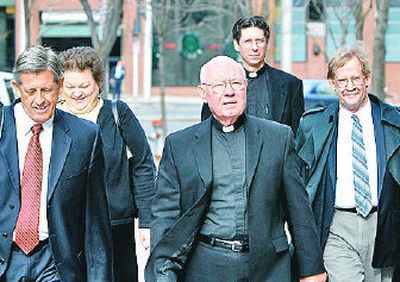Judge OKs diocese settlement

A federal bankruptcy judge on Tuesday approved a $48 million plan that will free the Spokane Catholic Diocese from bankruptcy protection after two and a half years.
The confirmation of the plan by U.S. Bankruptcy Judge Patricia Williams was a key step. Now, the 82 parishes of the diocese can begin raising money to pay claims by the more than 170 victims of clergy sex abuse.
“Although this day has been long in the making, this is not a day of rejoicing,” said Bishop William Skylstad. “The damage has been profound.”
The parishes are expected to raise $10 million by year’s end. An additional $6 million will be raised by Skylstad from what he referred to only as “syndicated Catholic groups” outside of Spokane, such as other dioceses.
The $16 million commitment is secured by parish properties, a fact that concerns some parishioners.
Skylstad’s decision to file for bankruptcy earned criticism from many in the laity, including local and national Catholic lawyers, who said the diocese should have tested some of the sex-abuse cases at trial before seeking Chapter 11 bankruptcy protection. Some victims also have said they would have preferred to take on the diocese in trial.
Michael Ross, a sex-abuse victim who was one of the claimants in the case, accused the bishop of mismanaging the diocese.
“He has mortgaged his diocese for $48 million to save himself from taking the witness stand at trial,” Ross said. “That’s why parishioners will have trouble giving money.”
Each victim will be paid between $15,000 and $1.5 million, depending on the severity of abuse.
An additional $1 million is set aside for future claims, ensuring that children and adults who might not yet have stepped forward can file claims for the next 20 years.
Skylstad said when the Catholic child sex abuse crisis hit Spokane, “there were more victims than we ever dreamed of.”
The enormity of the cases, the legal liability and uncertain insurance status pointed the diocese toward bankruptcy as the only means to save the ministry from financial ruin, he said. It also helped provide equal treatment to all victims – from those who had already sued the diocese to those who had yet to come forward.
Listening to Skylstad testify Tuesday on the merits of taking the diocese into bankruptcy, and then apologize without having to be subjected to cross-examination, left some victims upset.
“Seeing him up there makes me sick to my stomach,” said abuse victim Mike Shea. “As victims we’ve been sentenced to a lifetime of cynicism.”
The Rev. Mike Savelesky, of Spokane, testified that the parishes were up to the task of raising money, though some may require swing loans to cover any shortfall.
He disputed the notion, expressed by critics within the Catholic laity, that the Association of Parishes acted as yes men for the diocese.
“Quite the contrary,” Savelesky said, recalling how the parish association decried an earlier, more costly settlement offer and helped torpedo the deal even as Skylstad pushed for its acceptance.
Ford Elsaesser, an attorney who represented the association, said he regretted that it took millions of dollars in legal fees and one and a half years to get serious about a settlement offer. The sides reached a $48 million mediated settlement under the direction of U.S. Bankruptcy Judge Gregg Zive, of Reno, Nev.
“If you looked at all the risks and costs facing the parishes,” Elsaesser said, “this was the fairest possible result.”
The Spokane diocese bankruptcy could be settled only with the millions of dollars from parishioners. That separates it from other dioceses nationally that have large sums invested in real estate and investment accounts.
Leo Driscoll, a retired attorney and well-regarded fixture of the Spokane legal community, said in his opinion the settlement circumvented state laws and coerced parishioners into giving money without full disclosure from the diocese.
He said parishioners deserve to know what the diocese knew and when, how it responded and what it did to stop the abuse by its clergy.
“It is in my interest that we parishioners be reasonably informed of the responsibility and culpability of the diocese,” he told Williams at the hearing Tuesday, noting that parishioners and the public know “not one whit of information about the failures” of the diocese to protect children.
Some parishioners are upset with Skylstad’s insistence that all of them must atone for the actions of priests, bishops and any parishioners who knew what was happening decades ago and did nothing to stop it.
There have been allegations by victims that Skylstad and others have conducted a cover-up.
Diocese attorney Greg Arpin called allegations of a cover-up untrue and said after the hearing that the diocese handed over internal files to victims’ attorneys and has nothing to hide.
Judge Williams dismissed Driscoll’s objections.
Skylstad has been bishop in Spokane for 17 years and is now the president of the U.S. Association of Catholic Bishops.
At a news conference after the hearing, he apologized and called the child sex abuse crisis shameful and wrong. He spoke of healing and hope that the church can renew its ministry and learn from its egregious mistakes:
“I apologize for the wrongs that were done, and I ask forgiveness.”